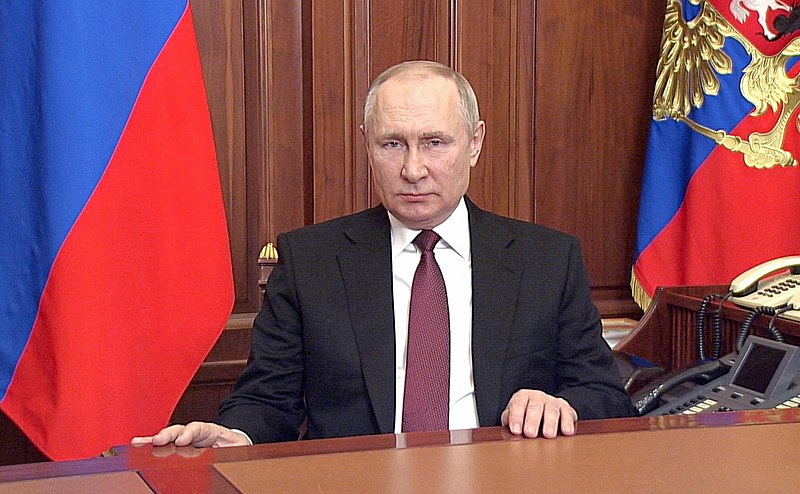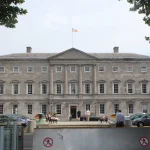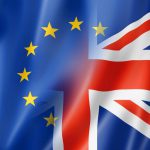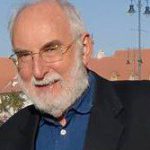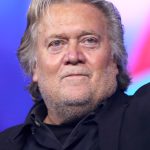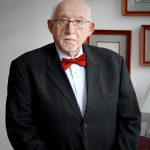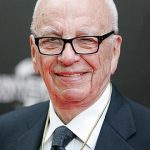Vladimir Putin has been a player on the world stage for some time – now he’s on London’s theatre stage.
The AEJ’s Anthony Robinson, former FT correspondent in Russia and eastern Europe, has this look at the new play Patriots which dramatises Putin’s rise to power through the eyes of oligarch Boris Berezovsky.
It is written by celebrated British playwright and screenwriter Peter Morgan, author of The Crown, The Audience, Frost/Nixon, and The Queen among others.
Review of “Patriots” — the context behind a gripping stage play
by Anthony Robinson
23 July 2022
U.S. President Ronald Reagan described the Soviet Union as an “empire of evil”. In reality the sclerotic, bankrupt but nuclear armed regime inherited by Mikhail Gorbachev in 1985 was more pathetic than evil. Evil is however a fair description of the neo-Stalinist regime recreated by Vladimir Putin who masquerades as a “patriot” in the eponymous high tension drama written by Peter Morgan which is running at the Almeida theatre in London. His rival for the title is the Jewish uber-oligarch Boris Berezovsky, who set out to enrich himself but also to liberate Russians from the stifling bonds of Soviet life in the process.
Stalin bent the Soviet Union to his will by unbridled terror and the murder of millions. Putin’s regime is more economical. It shoots or poisons the odd brave opponent. But the list which includes Anna Politkovskaya, Alexander Litvinenko, Boris Nemtsov, the Skripals and most recently Alexei Navalny is demonstrative. Putin acts like the 18th century British navy which, in Voltaire’s immortal words “shoots an admiral from time to time – to encourage the others.”
Similar tactics are used in Putin’s undeclared war against Ukraine as his army lobs artillery shells or rockets into unsuspecting Ukrainian towns far from the front line. To sow terror. Putin may pray to God in gaudy orthodox cathedrals but his actions demonstrate true belief in the Leninist doctrine that “the end justifies the means” – in this case restoration to Russia of the lands and Imperial borders conquered by the Romanovs.
Fanatical devotion to such an exalted vision of a restored Imperial Russia is what qualifies him as a “patriot” as portrayed in Peter Morgan’s play. Restoring the empire however is the mature obsession of the now ageing and self-isolated tyrant. His early years were devoted to re-building a vertical power structure controlled by secret police “siloviki” not the Communist party.
The younger Putin who commands our attention in the play is still unsure of his grip on power and carries with him the awkward and apparently shy demeanour of the young kid from a tough Leningrad housing estate who used to hunt rats with a big stick.
Will Keen, who plays Putin, must have spent hours watching tapes before impersonating the slightly hangdog look, stiff posture and unconvincing gangster swagger of the man who in quick succession had been appointed head of the FSB secret police, prime minister and then president by the ailing, exhausted and drunk Boris Yeltsin.
At the time, New Year 2000, Yeltsin hailed the almost casual transfer of potentially unbridled power to Putin as just like the sort of peaceful transfer of power which follow elections in democracies. In fact the ceremony was just another “Potemkin village” – a showy facade to hide the dirt and grime underneath.
Far from being a legitimately elected president, Boris Berezovsky – the mercurial Jewish oligarch, played brilliantly by Tom Hollander – boasts that Putin’s climb to supreme power was orchestrated by him and that he, the grey cardinal, had little Putin in his pocket.
Berezovsky was not alone in believing that his ties to the Yeltsin inner circle and promotion of Putin made him a commanding power in the land.
A brilliant mathematician and chaotic deal-maker, Berezovsky made his fortune “buying” boxy Lada cars on tick and paying the factory back in devalued roubles months later after hyper-inflation had turned roubles into worthless kopeks. He flaunted his new wealth, the archetypal “new man” of the post-Soviet free for all.
He was one of the seven oligarchs who bankrolled Boris Yeltsin’s presidential re-election campaign in 1996. Apart from Vladimir Potanin they were all Jews. Never was the wry joke “better an aunt in Chicago than an uncle in the politburo” more apposite than when Soviet power collapsed. The future lay with those who had access to foreign capital and above all knowledge of things like credit cards, leverage, marketing, consumer products which thousands of Soviet Jews picked up in New York, London or Tel Aviv after they were exiled in mass from the Soviet Union in the 1970s by the xenophobic Brezhnev regime.
Berezovsky charmed his way into Yeltsin’s inner circle. As Yeltsin grew weaker he promoted Putin, a former junior KGB spook in Dresden and then deputy mayor of St Petersburg. There Putin reportedly forged links with the criminal underworld which ran the profitable rackets which replaced the rigid old Soviet style management of the port and other assets.
Billionaire oligarch and self-professed kingmaker, Berezovsky was at the peak of his wheeler-dealer status at the start of the millennium when a diffident Roman Abramovitch, a much younger budding oligarch came to Berezovsky seeking protection, a “krysha” or roof.
Berezovsky quizzes and takes a shine to the ambitious young man. He promises to open doors and smooth paths in return for a pledge that Abramovitch will share the fabulous wealth on offer to those on the inside track of state property asset sales. Abramovitch agrees to give Berezovsky anything he asks for without question – a “gentleman’s agreement” without documents — which ends up years later in the English courts and Berezovsky’s humiliation.
It all starts to go horribly wrong for Berezovsky soon after Putin becomes president. He engages that rare creature, an honest and decent FSB officer, in the person of Alexander Litvinenko, for his own protection as he senses his power slipping. Suddenly, instead of being able to waltz into the Kremlin unannounced and throw his weight around, he comes up with shock against the icy real nature of the man he mistook as a stooge.
The moment of truth is when Berezovsky turns up at the Kremlin unannounced to protest about Putin convening a key meeting with all the main oligarchs without consulting him about it first. This was the day when Putin told the oligarchs that henceforth they should concentrate on their businesses and not interfere in politics. Faced with the usual bluster Putin coldly enquires whether Berezovsky has an appointment.
Realising that the game is up Berezovsky jumps on his plane and flies to London and to an exile in opposition which ends as he prepares to hang himself after receiving no reply to a letter of abject surrender which he sends to Putin in a last ditch attempt to return to Moscow and Mother Russia. Putin reads the letter, drafts a harsh reply – then tears it up, unsent.
In the final scene Berezovsky talks to a ghostly Litvinenko and tells him his death was terrible but heroic, while he ties a noose for himself around the chandeliers and prepares to die, alone, unloved and abandoned in his gilded exile
“Patriot Putin” meanwhile, beyond the scope of Morgan’s play, goes on to crush internal opposition and media freedom and take advantage of the Yeltsin era economic reforms and the massive windfall of high energy and raw material export prices to re-build the army and police forces, He also creates an over 300,000-strong praetorian National Guard, re-establishes Belarus and Kazakhstan as Russian protectorates, re-builds Soviet-era ties with Middle Eastern. Latin American and African despots – and confidently expected victorious Russian troops to march in triumph through Kiev as the crowds threw flowers at their “liberators.”
As Mrs Thatcher’s ally Norman Tebbit once said of Tony Blair “poor deluded man”. The sad truth behind the two conflicting “patriotic” visions of Russia’s future – as a western-style society with a functioning market economy under the rule of law or a Mongol style despotism — is that Russia seems fated by nature and history to continue oscillating between East and West, either threatening or licking its self-inflicted wounds. That is the drama underlying this brilliant play.
From a friend of Boris Berezovsky
Peter Morgan
Patriots review – The Guardian
Patriots review – Time Out
Patriots review – Matthew d’Ancona

